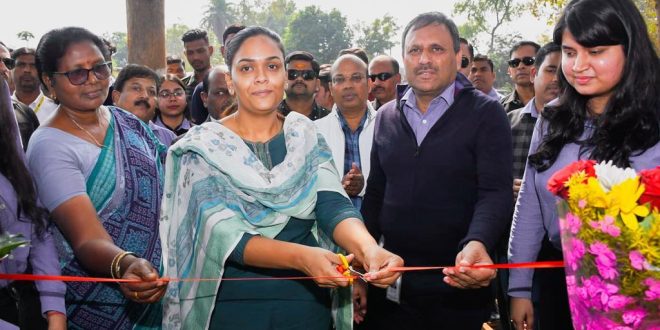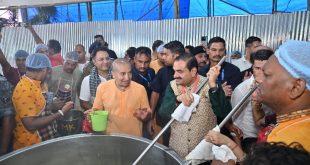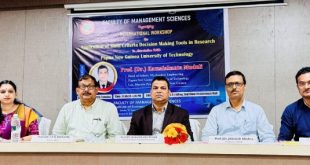Jharsuguda: Vedanta Aluminium, India’s largest producer of aluminium, dedicated 130 ‘Nand Ghars’ in a ceremony at Jharsuguda.
The ‘Nand Ghars’ are a network of ‘modernised anganwadis’ supported by Vedanta and function as hubs of women and child development in a bid to accelerate development of local communities.
The newly-inaugurated ‘Nand Ghars’ are now set to transform the lives of over 7,000 children in 127 villages within Jharsuguda district.
The inaugural event was graced by Dipali Das, MLA, Jharsuguda, Prabir Kumar Nayak, Project Director, District Rural Development Agency (DRDA), Jharsuguda, Punyabati Helen Khes, District Social Welfare Officer, Jharsuguda and Sunil Gupta, COO, Vedanta Aluminium.
Appreciating Vedanta’s developmental efforts in the district, Dipali Das said, “I would like to thank Vedanta and Anil Agarwal Foundation for modernising our anganwadis with all essential amenities for the holistic development of children and their mothers. I must commend Vedanta for their unabated efforts to drive deep developmental initiatives such as its state-of-the-art diagnostic centres in Jharsuguda and Laikera. Businesses like Vedanta that are driven with community welfare at their core truly bring about a positive change in the community.”
Prabir Kumar Nayak, Project Director, District Rural Development Agency, further added, “Vedanta’s Nand Ghars play a crucial role in the overall development of children, laying a robust foundation of quality education in their pre-schooling years using advanced learning tools that are distinctive from the traditional classroom set up.”
Punyabati Heen Khes, District Social Welfare Officer, Jharsuguda, remarked, “I express my gratitude to Vedanta for infusing a sense of enjoyment into children’s learning, and earnestly urge Vedanta to extend its transformative efforts to all anganwadis, ensuring comprehensive growth for every child.”
Highlighting the company’s commitment to grassroots development, Sunil Gupta, COO, Vedanta Aluminium, said, “Vedanta’s Nand Ghars represent our Chairman Anil Agarwal’s vision of accelerating women and child development across India at the very grassroots through focused development programs.”
“Through substantial investments in modern infrastructure and holistic trainings, we are opening new avenues for rural women and ensuring that India’s children have a strong start in life. This is helping transform entire communities in rural areas and bringing them into the socio-economic mainstream,” added Gupta.
The Nand Ghars are equipped with smart television sets for immersive and standardized education, water purifiers for reliable drinking water, clean toilets to promote community hygiene, and, solar panels to ensure 24X7 electricity. Designed in accordance with the Building As Learning Aid (BALA) approach, the walls of the school building feature engaging and interactive learning resources. Together, they embody an integrated approach to child welfare and women’s empowerment.
Launched in 2015, Nand Ghar is Vedanta’s flagship community initiative, developed under the aegis of the Anil Agarwal Foundation in collaboration with the Government of India’s Ministry of Women & Child Development. Nand Ghars go beyond traditional anganwadis, providing holistic services in the areas of education by providing pre-school readiness to children under 6 years of age, wholesome nutrition through nutritious meals and take-home rations for pregnant and lactating women, improved healthcare through ANM staff (auxiliary nurse/midwives) and skill development through training programmes for women.
The project is closely aligned with the UN Sustainable Development Goals (UN SDGs) of Zero Hunger (Goal 2), Good Health & Well Being (Goal 3), Quality Education (Goal 4), and Reduced Inequalities (Goal 10).
Vedanta’s social interventions in the domains of education, healthcare, livelihood, skill development, grassroots sports, art & culture, with a focus on women and child development, reach out to nearly 80 villages in Jharsuguda and nearby areas, benefiting over 3 lakh people in a year. It empowers more than 4000 women from over 358 SHGs, provides doorstep healthcare services to about 43,000 people annually, gives educational support to more than 13,000 students, has planted more than 1.48 lakh trees in partnership with locals at the community level.
 Update Odisha-Latest Odisha News I Breaking News Get latest news on Odisha, Govt. Jobs, OSSC, OPSC, Entertainment, Crime, Sports, and Education
Update Odisha-Latest Odisha News I Breaking News Get latest news on Odisha, Govt. Jobs, OSSC, OPSC, Entertainment, Crime, Sports, and Education



